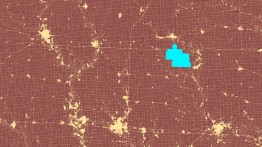Confronting Carbon Form
Tue, Mar 21, 2023 6:30pm - Sun, Apr 16, 2023 7pm

The daily spatial footprint of a rural inhabitant, shown within the context of regional production patterns near Iowa Falls, Iowa.
A new spatial order was born in the fossil fuel age: new building typologies and urban archetypes emerged to meet the demands of a new economy while unprecedented mobility fundamentally changed human perception of space. From the steam engine onward, these architectural and urban configurations—which could be referred to as carbon form—have enmeshed the cultural, economic, and political aspects of social life within an energy-intensive network of space and form. They are also the spatial roots of the climate crisis.
This exhibition is dedicated to the study of carbon form. Central to this work is the premise that the spatial building blocks of an extractive economy remain unchallenged, despite permutations in architectural discourse over the past two centuries, and despite advancements in building technology. The proliferation of carbon form continues unabated, revealing that at the core of the climate crisis, there is a spatial problem.
Confronting Carbon Form repositions architecture’s relationship to energy within a spatial and formal discourse, arguing that alternatives will remain unlikely until we better understand the nature of carbon form and how it came into being. Featuring original works by Elisa Iturbe, Stanley Cho, and Alican Taylan, the exhibition looks to history and precedent to confront the urban archetypes, building typologies, and spatial concepts that must now be supplanted and transformed, an undertaking that is just as important for understanding architecture’s complicity in the climate crisis as it is for locating fruitful terrain for climate action.
Curator Bios:
Stanley Cho is co-founder of Outside Development, a design and research practice. Cho studied at UCLA Design Media Arts and the Yale School of Architecture. His works have been shown at international film festivals such as Chicago and Oberhausen. He has project-managed and designed various public facilities for the New York City Department of Parks and Recreation.
Elisa Iturbe is an Assistant Professor at The Cooper Union. Her research and writing are currently focused on the relationship between energy, power, and form. Iturbe also teaches courses on fossil capitalism and carbon modernity at the Yale School of Architecture and at Cornell AAP. Her writings have been published in AA Files, Log, Perspecta, New York Review of Architecture, and Antagonismos. She guest-edited Log 47, titled Overcoming Carbon Form and co-wrote a book with Peter Eisenman titled Lateness. She is co-founder of Outside Development, a design and research practice.
Alican Taylan is a Ph.D. student in Architecture History at Cornell University. His research is currently centered on environmental history and early modern architecture. Recently, he was a visiting assistant professor at Pratt Institute's graduate architecture and urban design department and has worked in the offices of Peter Eisenman, Shigeru Ban, and Thomas Leeser. He contributed to the 2018 Turkish pavilion at the Venice Biennale, co-curated the first alumni-run exhibition at Pratt Institute’s School of Architecture, Aesthetics of Prosthetics (2019), and collaborated with Blane De St. Croix on the exhibition design of How to Move a Landscape (2020) at the Massachusetts Museum of Contemporary Arts.
Free and open to the public.
Opening reception: Tuesday, March 21, 6:30 pm
Exhibition hours: Monday – Sunday, 12 pm – 7 pm
Supported by Graham Foundation for Advanced Studies in the Fine Arts.
Supported by Independent Projects, a partnership program of the New York State Council on the Arts and The Architectural League of New York. Independent Project grants are made possible with public funds from the New York State Council on the Arts, with the support of the Office of the Governor and the New York State Legislature.
Exhibitions and events presented by The Irwin S. Chanin School of Architecture Archive are made possible by the New York State Council on the Arts with the support of the Office of the Governor and the New York State Legislature. 
Located in the Arthur A. Houghton Jr. Gallery, 7 East 7th Street, 2nd Floor, between Third and Fourth Avenues




